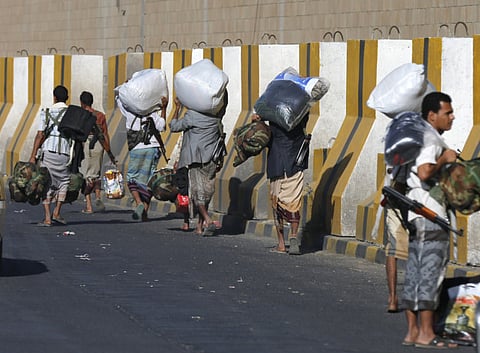GCC condemns ‘coup bid’ in Yemen
Aden shuts its airport, seaports as 'city borders closed due to situation in Sana’a'

Sana’a: Gulf Cooperation Council foreign ministers on Wednesday accused Al Houthi militia in Yemen of attempting to stage a “coup” against President Abd Rabbo Mansour Hadi, a day after the Al Houthi fighter seized the presidential palace.
“The states of the Gulf Cooperation Council consider what happened in Sana’a on Tuesday... a coup against the legitimate authority,” the ministers said in a statement following an emergency meeting in Riyadh.
The GCC also expressed support for the “constitutionally legitimate authority” of Hadi, and rejected “all measures aimed at imposing change by force”.
They warned that Gulf states “would take all measures necessary to protect their security, stability and vital interests in Yemen.”
The ministers offered to send a GCC envoy to Yemen for mediation if Al Houthis withdrew from the presidential palace and other government buildings and freed Hadi’s abducted chief of staff Ahmad Awad Bin Mubarak. They also called for the withdrawal of militiamen around Hadi’s residence in western Sana’a.
Gulf countries had brokered an accord in November 2011 that eased former president Ali Abdullah Saleh out of office following a year of nationwide protests.
Meanwhile, Aden shut its airport in support of Hadi yesterday amid growing international concern over attacks by the Al Houthi militia on the authorities.
The powerful militia seized almost full control of the capital Sana’a in September and have fought battles with government forces this week as they press for more political power.
At least 18 people have been killed in the fighting that erupted on Monday and dozens more wounded, medical sources said.
The UN Security Council condemned the attacks and backed Hadi as Yemen’s “legitimate authority”.
Dangerous developments
Yemen’s deposed leader Ali Abdullah Saleh, suspected of backing the rebels’ power grab, urged his successor to call early elections as a way out of the deepening turmoil in the country. He also advised him to seek “national unity.”
Aden’s main security body said in a statement that it was closing its airport, its seaport and entrances to the city due to “dangerous developments in the capital” and “attacks on the symbol of national sovereignty and constitutional legitimacy.”
Residents said hundreds of pro-government militia fighters had also arrived in Aden from several southern provinces. The rising unrest has fuelled longtime divisions in Yemen, where the government, Al Houthis, southern separatists, powerful Sunni tribes and the local Al Qaida branch are all vying for influence. It has raised fears of a collapse of Hadi’s Western-backed government, a key ally in Washington’s fight against Al Qaida, and the country descending into chaos.
The Al Houthis began increasing pressure on the authorities on Saturday with the kidnapping of Hadi’s chief of staff, Ahmad Awad Bin Mubarak, in an apparent bid to extract changes to a draft constitution opposed by the militia. Mubarak is leading efforts to reform how the country is governed under a “national dialogue” set up after former strongman Ali Abdullah Saleh was forced from power in February 2012 following a year of bloody protests inspired by the Arab Spring.
His plans for dividing Yemen into a six-region federation have angered the Al Houthis, who claim it would split the country into rich and poor regions. Both Hadi and Mubarak are from the south.
Heavy fighting broke out on Monday around the presidential palace and in other parts of Sana’a, with the Al Houthis seizing a key army base, taking control of state media and firing on a convoy carrying the prime minister, before a ceasefire was agreed.
Sign up for the Daily Briefing
Get the latest news and updates straight to your inbox


